
The European Union (EU) is a supranational political and economic union of 27 member states that are located primarily in Europe. The union has a total area of 4,233,255 km2 (1,634,469 sq mi) and an estimated total population of over 448 million. The EU has often been described as a sui generis political entity combining the characteristics of both a federation and a confederation.

The European Commission (EC) is part of the executive of the European Union (EU), together with the European Council. It operates as a cabinet government, with 27 members of the Commission headed by a President. It includes an administrative body of about 32,000 European civil servants. The Commission is divided into departments known as Directorates-General (DGs) that can be likened to departments or ministries each headed by a Director-General who is responsible to a Commissioner.
In international relations, intergovernmentalism treats states as the primary actors in the integration process. Intergovernmentalist approaches claim to be able to explain both periods of radical change in the European Union because of converging governmental preferences and periods of inertia because of diverging national interests. Intergovernmentalism is distinguishable from realism and neorealism because it recognized the significance of institutionalisation in international politics and the impact of domestic politics upon governmental preferences.

The president of the European Commission is the head of the European Commission, the executive branch of the European Union (EU). The president of the Commission leads a cabinet of Commissioners, referred to as the College. The president is empowered to allocate portfolios among, reshuffle, or dismiss Commissioners as necessary. The College directs the commission's civil service, sets the policy agenda and determines the legislative proposals it produces. The commission is the only body that can propose or draft bills to become EU laws.

Roy Harris Jenkins, Baron Jenkins of Hillhead, was a British politician who served as the sixth president of the European Commission from 1977 to 1981. At various times a Member of Parliament (MP) for the Labour Party, Social Democratic Party (SDP) and the Liberal Democrats, he was Chancellor of the Exchequer and Home Secretary under the Wilson and Callaghan Governments.

The Economic Community of West African States is a regional political and economic union of fifteen countries located in West Africa. Collectively, these countries comprise an area of 5,114,162 km2 (1,974,589 sq mi), and in 2019 had an estimated population of over 387 million.

The Group of Eight (G8) was an inter-governmental political forum from 1997 until 2014. It had formed from incorporating Russia into the Group of Seven, or G7, and returned to its previous name after Russia was expelled in 2014.

The European Union (EU) has expanded a number of times throughout its history by way of the accession of new member states to the Union. To join the EU, a state needs to fulfil economic and political conditions called the Copenhagen criteria, which require a stable democratic government that respects the rule of law, and its corresponding freedoms and institutions. According to the Maastricht Treaty, each current member state and the European Parliament must agree to any enlargement. The process of enlargement is sometimes referred to as European integration. This term is also used to refer to the intensification of co-operation between EU member states as national governments allow for the gradual harmonisation of national laws.
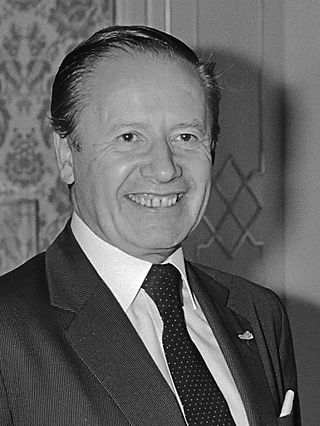
Gaston Egmond Thorn was a Luxembourg politician who served in a number of high-profile positions, both domestically and internationally. Amongst the posts that he held were the 19th prime minister of Luxembourg (1974–1979), President of the United Nations General Assembly (1975), and the seventh president of the European Commission (1981–1985).

The Group of Seven (G7) is an intergovernmental political forum consisting of Canada, France, Germany, Italy, Japan, the United Kingdom and the United States; additionally, the European Union (EU) is a "non-enumerated member". It is organized around shared values of pluralism, liberal democracy, and representative government. As of 2020, G7 members are large IMF advanced economies and account for over half of global net wealth, 30 to 43 percent of global gross domestic product, and 10 percent of the world's population. Its members maintain mutually close political, economic, diplomatic, and military relations in global affairs.
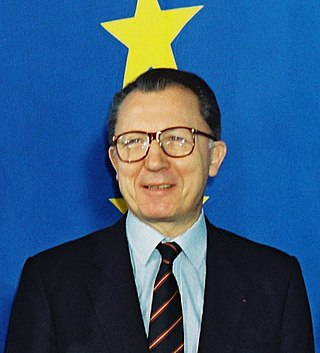
The Delors Commission was the administration of Jacques Delors, the eighth President of the European Commission. Delors presided over the European Commission for three terms. The first term lasted from 1985 to 1988, the second until 1992 and the final one until 1994, making Delors the longest serving president, and his Commission is also seen as the most successful at advancing European integration. It was the only Commission to serve three times, and Delors served five two-year terms. The third Commission was the first Commission of the European Union, the Maastricht Treaty having come into force in 1993.

The G20 or Group of 20 is an intergovernmental forum comprising 19 countries and the European Union (EU). It works to address major issues related to the global economy, such as international financial stability, climate change mitigation and sustainable development.
A continental union is a regional organization which facilitates pan-continental integration. Continental unions vary from collaborative intergovernmental organizations, to supranational politico-economic unions. Continental unions are a relatively new type of political entity in the history of human government. Throughout most of human history, political organization has been at the local level and in more recent centuries, the sub-regional ("regional")/sub-continental level ; however, starting with the advent of better transportation, weapons and communication there was for the first time the ability for a union of member states to organize at the continental level. After the devastation of the First and Second World Wars in the middle of the twentieth century, Europe began to slowly integrate with the founding of the "European Community", which became a political union covering much of the European continent.
The Ortoli Commission is the European Commission that held office from 6 January 1973 to 5 January 1977. Its President was François-Xavier Ortoli.

The Rey Commission is the European Commission that held office from 2 July 1967 to 30 June 1970. Its president was Jean Rey.
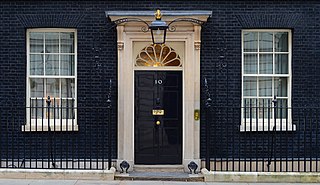
The 3rd G7 Summit was held in London, United Kingdom between 7–8 May 1977. The venue for the summit meetings was the British Prime Minister's official residence at No. 10 Downing Street in London.

The 5th G7 Summit was held at Tokyo, Japan between June 28 and 29, 1979. The venue for the summit meetings was the State Guesthouse.

Between 1973 and 1993 the European Communities saw the first enlargement of the Communities. On 1 January 1973, Denmark, Ireland, and the United Kingdom became the first countries to join the Communities. The détente allowed initiation of the reunification of the continent through establishing the Conference on Security and Co-operation in Europe. Greece was the next to join EC on 1 January 1981, followed by Spain and Portugal joining on 1 January 1986, while Turkey has initiated the procedure in 1987. Upon the fall of the Iron Curtain, the CSCE was transformed in 1990 into Organization for Security and Co-operation in Europe, the Communities enlarged for a fourth time through the German reunification, while other former communist European countries stated their firm commitment to join, prompting formulation of the Copenhagen criteria. This period was, however, also the one which witnessed the first voluntary exit from the Communities, namely the one of Greenland in 1985. The integration progressed under the Delors Commission resulting in the creation of the European Union in 1993.
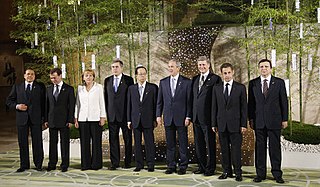
The European Union (EU) is a member of the G7. It has been dubbed its "8th member", holds all the privileges and obligations of membership but without the right to host or chair a summit. As the full name of the G7 is the "Group of Seven Nations", the EU has not been included in the number, hence there being eight members in the G7.
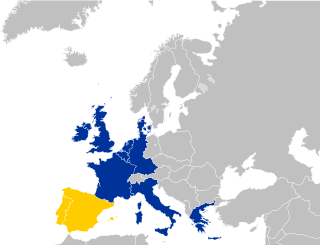
Spain and Portugal acceded to the European Communities, now the European Union, in 1986. This was the third enlargement of the Communities, following on from the 1973 and 1981 enlargements. Their accessions are considered to be a part of the broader Mediterranean enlargement of the European Union.















